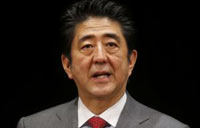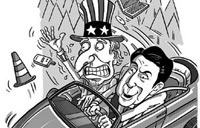Redemption or self-deception
By Yujing Shentu (China Daily) Updated: 2014-02-13 07:18The attempts of Japanese Prime Minister Shinzo Abe and other politicians to change history, combined with his visit to Yasukuni Shrine, which honors 14 Class-A and hundreds of lesser war criminals, on Dec 26, has further soured relations between China and Japan. Especially nauseating has been the denial of "Nanjing Massacre" and trivialization of the "comfort women" issue by NHK (Japan Broadcasting Corporation) chief Katsuto Momii.
|
 An abyss of disgrace |
|
 A subtle US warning for Abe |
Abe says he visited Yasukuni to pray for the souls of the people who laid their lives for Japan. But if he is really keen on doing so, he can visit Tokyo's Chidorigafuchi National Cemetery, which houses the remains of unidentified Japanese who died during World War II.
What redemption is Abe seeking by praying to war criminals who were responsible for the attack on Pearl Harbor and the massacre and rape of millions of people in countries neighboring Japan? Or is he trying to invoke the ghost of his grandfather, role model and former Japanese prime minister Nobusuke Kishi, who escaped conviction as a Class-A war criminal at the Tokyo Trials, to rebuild Japan into an aggressive military power?
The psychology of being victimized by the victors of World War II is permeating the Japanese political class. The historical narratives about World War II in the Yasukuni War Museum besides the Yasukuni Shrine compound glorifies Japan's attack on Pearl Harbor and brutal invasion and colonization of Asian countries as contributing to "world peace".
Another noteworthy fact is that the Yasukuni War Museum has a memorial to Radhabinod Pal, the Indian judge who was the lone dissenting voice among the jurists at the Tokyo Trials. Pal is known to have argued that not all the Japanese defendants were guilty, and equated the dropping of the atomic bombs on Hiroshima and Nagasaki with the worst atrocities of World War II. Abe has been promoting Pal's views, saying, "Pal is highly respected even today by many Japanese for the noble spirit of courage he exhibited during the International Military Tribunal for the Far East (or Tokyo Trials)", to force Japanese people to believe that their country has been victimized by the victors.
Abe seems to be on a mission to change the post-war international order imposed by the "victorious powers". And to achieve his goal, he has been strengthening Japan's Self-Defense Forces and deploying them beyond the country's borders in contravention of Japan's "defense-only" policy, which could be seen as a revival of Japanese militarism.











